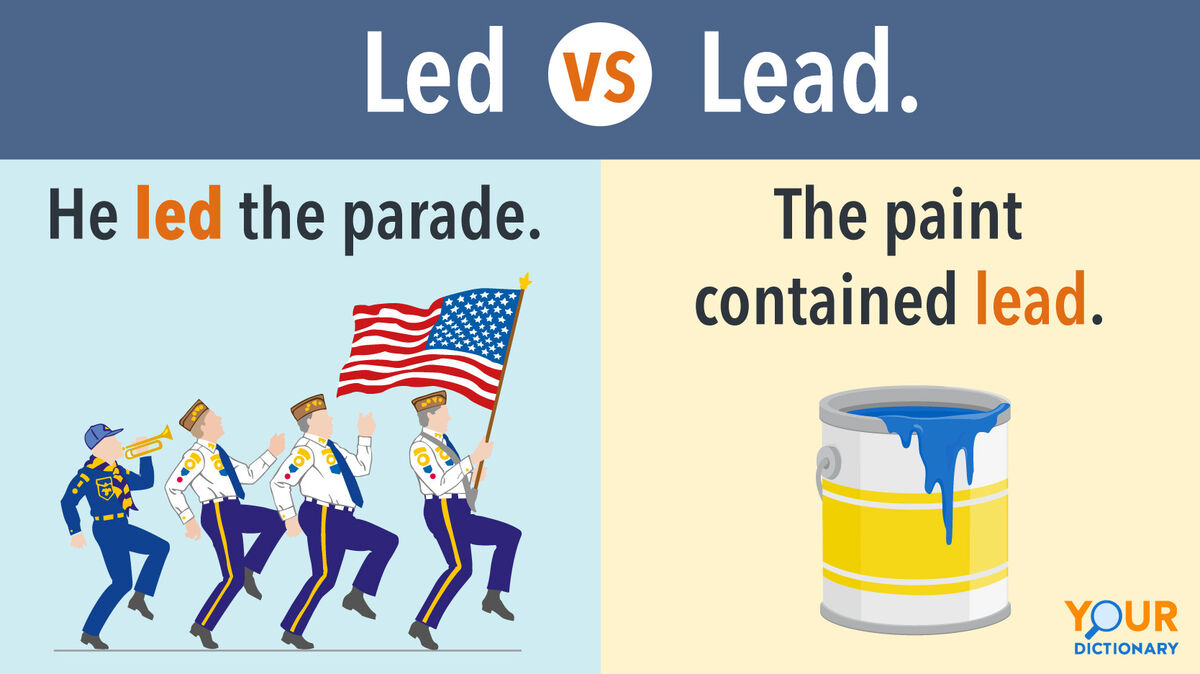

The present tense forms lead and feed have four letters the past-tense forms, led and fed. One could also compare it to the words feed and fed, which rhyme with and have a similar structure to lead and led. (Tragedian Euripides) He led the race before tripping over a water bottle on the road. The present participle of lead to is leading to. Led 'Led' is the past tense of the verb 'to lead.' For example: Ten soldiers wisely led will beat a hundred without a head. The third-person singular simple present indicative form of lead to is leads to. Without context, it is impossible to know whether "lead" should be pronounced "leed" or "led." However, it is unusual to find the word "lead" without sufficient context to establish which version is meant. Present is a longer word than past lead is a longer word than led. Lead poisoning occurs as the element crowds out the minerals your body needs to function, such as calcium and iron. Merriam-Webster suggests that if you aren’t sure whether to write 'led' or 'lead' as the verb in your sentence, try reading it aloud to yourself. (The word "led" is a past participle in this example.) To use 'led,' simply use it as the past tense or past participle for 'lead,' as in: He, alone, 'led' the group to safety. (This is the verb "to lead" in the past tense.) The word "led" is the past tense and the past participle of the verb Someone has stolen the lead from the church roof again.In the UK, it is illegal to use lead for weights in fresh-water fishing.

"Lead" that rhymes with "bed" is a soft heavy toxic metallic element. You have been selected to be the lead tenor."Lead" that rhymes with "seed" is associated with being in charge or being in front. Lead (rhymes with red) is a noun for the soft metal. "Lead" can be an adjective, noun, or verb: The verb lead (rhymes with bleed) means to direct on a course and its past tense is led (rhymes with red). Let me tell you the secret that has led me to my goal.The past progressive tense is for an ongoing activity in the past.

He led the race before tripping over a water bottle on the road. The simple past tense is for a completed activity that happened in the past.Ten soldiers wisely led will beat a hundred without a head."Led" is the past tense of the verb "to lead." For example: Lead poisoning occurs as the element crowds out the minerals your body needs to function, such as calcium and iron.As it is soft, has a relatively low melting point, is easy to shape, and doesn't corrode much, lead is incredibly useful."Lead" (rhymes with "bed") is a soft toxic metal. Science, my lad, is made up of mistakes, but they are mistakes that lead little by little to the truth.This isn’t always consistent with other similar English. However, things can get more confusing when we consider that the past tense of lead (the verb) is led. Geraint Jones has taken the lead in the race. Most native speakers of American English understand that difference well enough, particularly because lead the noun (metal) and lead the verb (action of being a leader) sound different.Captain Smith will lead the company while I am away."Lead" (rhymes with "seed") is associated with being in charge, being at the front, or showing the way. As for the misconceptions, well, when you. In other words, lay takes a direct object, and lie does not.

Lie is a verb that commonly means to be in or to assume a horizontal position (or to make an untrue statement, but we’ll focus on the first definition). Writers' confusion over the words "lead" and "led" is understandable because "lead" can be pronounced two ways, one of which is "led." Here is a summary of the situation: Lay is a verb that commonly means to put or set (something) down. It could be because of the noun lead which rhymes with led.īut most likely, it’s hard to remember if the past tense is lead or led because the past tense of read is… read (which also rhymes with red).Search our site by Craig Shrives What Is the Difference between "Lead" and "Led"? It could be because of words like bread, head, dead, thread, stead, dread, and spread. Her chosen course of study led to a degree in forensics. We were led to believe there would be snacks. The bread crumbs led the children back to their home. The parade was led by a row of baton twirlers. The search dog led us right to the suspect. Translate lead in context and see lead definition. The verb lead, which rhymes with bleed, has a past tense (like most verbs) and that past tense rhymes with bed. Conjugate lead English verb: past tense, participle, present perfect, present continuous, past perfect, gerund.


 0 kommentar(er)
0 kommentar(er)
